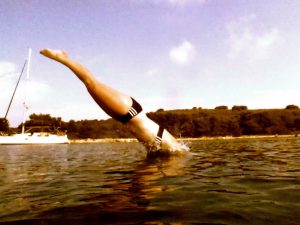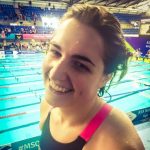Not training is not, not training.
 In my examination of the challenges of recovery, this is, for me, the strongest and trickiest feeling to deal with: the insecurity of doing what is perceived as ‘nothing’. Training feels like taking control, being active, pursuing your goals and making use of your life; sitting still does not.
In my examination of the challenges of recovery, this is, for me, the strongest and trickiest feeling to deal with: the insecurity of doing what is perceived as ‘nothing’. Training feels like taking control, being active, pursuing your goals and making use of your life; sitting still does not.
The pathway to success in any pursuit is so often depicted as a great struggle, an overcoming of adversity a suffering of great pain. This may be accurate in certain contexts but it becomes problematic when applied literally. As a general rule our bodies are set up as self-monitoring systems, if listened to properly they tell us what to do to heal ourselves quickly. The pain of a pulled muscle or overtraining-induced chronic fatigue is not something to be ‘struggled through’, ‘overcome’ or ‘suffered’ it is a highly specific instruction as to what your body requires from you in order to fix itself: don’t bear heavy loads with this arm please, or exercise less, sleep more! For athletes, following this seemingly simple instruction is doubly complicated by the fact that we are predisposed to endure and even welcome large volumes of physical pain. As a result, we end up finding that we are most comfortable while physically hurting, (how many times have you felt satisfaction waking up post training with a severely aching body?). This leaves us in a rather ironic position where pain is no longer painful, but allowing ourselves to stop hurting is.
Often upon deciding that I will not be going to the pool on any given day my thoughts move on to my diet: ‘Ok, so you’re not training today, in that case we’re restricting what you eat’. Another attempt to take control, to feel like I’m doing something to actively contribute to my sporting cause, a way to channel the guilt and fear I am feeling about not training. I can see that this is destructive and illogical but it nevertheless has me in an impressively tight grip and it requires a substantial effort to wriggle free.
We are comfortable when we feel we are taking charge of something, actively doing. Consequently, we are constantly scrambling to find ways to seize control of a process that doesn’t require interference. In times of damage your body needs rest, consistent sleep and high quality food. There is no fast tracking this process because rest is already the fastest track! The discomfort of the wait and desire for a quick fix is, however, universal and a phenomenon that has perhaps contributed to the rise of the ‘wellness’ industry. Not to say that practicing yoga or drinking a kale smoothie isn’t beneficial, but attempting to fix obsessive and excessive work and training habits by finding alternative things to do obsessively and excessively, (as I was inclined to do when I decided that I would restrict my food intake) is not the answer. Feeling insecure or shaken in the presence of an injury is normal and our focus should not be on trying to avoid the discomfort of feeling out of control, it should be on relaxing with it.
This is exacerbated by the story of athletic achievement that we are so often sold by western media and society. The first questions I am asked when I say I am a swimmer are always: ‘How many days of the week do you train? How many hours?’. Emphasis is perpetually given to the way sportspeople endure unimaginable physical pain, waking up at the crack of dawn every morning, completing monster training sessions. When asked, athletes themselves will more often than not cite their exemplary work ethic and the completion of seemingly insurmountable training sessions as the reasons for their success. When I wake up exhausted and my body is instructing me to rest, even with the confirmation of high levels of bodily stress through a depressed HRV reading, the very fact that what I want to do most is go back to sleep triggers a strong reaction of protest, self-disgust and bad-mouthing. You’re lazy, you’re weak, you just can’t be bothered to train etc. But the reason returning to bed is so appealing whereas a return to the pool is not, is that my system wants me to flourish. Bed will improve my physical condition where a hard training session wouldn’t.
In reality I have rarely met an athlete from good club level upwards who doesn’t have an impressive work ethic and the ‘barely bearable’ training sessions will make up twenty percent of an athletes overall training at maximum. Exceptional human achievement is not bestowed on those who have the greatest capacity to endure physical pain. Everyone can make themselves hurt. It is the quality and nature of training and recovery that differentiates one athlete from another.
We laud suffering, we glorify battle, we are suckers for a struggle and I would argue that this is often destructive. We hold up our sportspeople as the ultimate examples of how grit and grind leads to great success but this is a half story. The way that elite athletes rest and recover and the efficiency and skilled management of their recovery processes set them apart from the rest of us as much as the weights that they lift.
When athletes carry out training programmes that do not attend to their recovery properly and subsequently have their careers cut short by chronic injury, are spat out of their sport with depression or eating disorders, or simply battered into indifference by brutal training regimes, we ignore them. Worse than this, we dismiss their crashing and burning as an expected end point, inevitable. There seems to be an acceptance of the idea that athletic prowess eventually leads to physical destruction. Why should this be inevitable? There are already athletes in existence that have carved out long, sustainable and enjoyable careers and haven’t made crippling mental and physical ‘sacrifices’; they haven’t been broken by their sport. In one way or another this is down to the fact that they have found sustainable and healthy training methods and allowed themselves the time and space to recover properly. Some will have had to battle to get to this place, said no to coaches that are pushing them for another two hours in the gym or taken days, weeks or months out, (to the horror of peers and pundits), when they knew that they needed it. Others will have been lucky in finding that they are simply mentally and physically well suited to the training system and environment that they find themselves in. But your sport is your responsibility and if you want to get the most out of it, it will likely require you to go against the advice of a coach or the collective opinions of your teammates from time to time. The artist Banksy is famously quoted saying: ‘All artists are willing to suffer for their work. But why are so few prepared to learn to draw?’. To reach the point of injury, sickness or overtraining you have already demonstrated your capacity to suffer, now you must ‘learn to draw’; demonstrate that you can heal.
Doing nothing is so difficult to accept. We are blessed with a level of freedom and longevity that our grandparents never dreamed of. We have unprecedented access to the world. And with all this in mind it’s almost impossible to sit still. It feels like sacrilege, a waste of life. But not moving for a while does not equate to lack of direction. Every morning that I don’t go to the pool I worry that people will think I am uncommitted but my commitment to competitive swimming does not equate to a commitment to be at the pool for a set time period come rain or shine, it is a commitment to do all the things I can that will make me a faster swimmer, a far more diverse and interesting range of activities than simply being in the water for a given time every day.
It’s all well and good to be prepared to push your body to the limit, to cycle until you vomit, to squat until you cry, but we must be prepared to tackle all aspects of our athletic development and recovery is a key part of this. In the midst of a world that is seemingly screaming at you to climb a mountain, run a marathon and fight a bear, you must be strong enough to sit on the sofa and say: no, the mountain can wait, I need a nap.
About Georgina
 Georgina is a full-time athlete, sprint-swimmer based in the UK. Born in 1993 in Islington, London she moved in the summer of 1996 to rural Cheshire where she lived until early 2014 when she moved to Moscow. She spent the following two and a half years in Russia and returned to the UK at the end of September 2016.
Georgina is a full-time athlete, sprint-swimmer based in the UK. Born in 1993 in Islington, London she moved in the summer of 1996 to rural Cheshire where she lived until early 2014 when she moved to Moscow. She spent the following two and a half years in Russia and returned to the UK at the end of September 2016.
She is an accomplished all-round athlete having competed in multi-event athletics and alpine ski-racing.
After leaving school with A levels in Maths, Further Maths, Physics, English Literature and Art she began a Civil Engineering MSc course at the University of Bath in England before deferring her course in late 2011 in order to focus her activities on swim sprint racing.
When not training, eating and sleeping Georgina teaches flute, plays the piano and sings in various choirs and ensembles. She is currently involved in the building of a house in Birmingham and continues to study and learn to speak Russian. You can follow Georgina on Twitter or Instagram.

It needs training …to train.
Why wouldn’t it need training to …not train.
To do nothing.
Fareniente.
Truth is that : Yes, one can’t do nothing.
But one can:
Rest.
Enjoy.
Take pleasure.
Contemplate.
Study.
Socialize
Create
Look at the clouds
Listen to the river
Dream
Yes I know not very “productive”
in an era that worship labor.
Totally agree Yves-Marie. It has taken me 5 years to relish recovery by asking myself questions like these: I wonder how I can eat just the right things at the right time? How can I get a sleep score >80 on Beddit >5x per week? What’s the right type and amount of active recovery? How can I spend non-exercising free time in the most satisfying way?
I’m sure the list is long and different for everyone.
Thanks Georgina, your insight belies your age. You have learned so much in a relatively short time. Something that I am still learning to do, with a daughter your age. It’s the difference between listening to your body and making your body listen to you. Not easy, particularly during recovery.